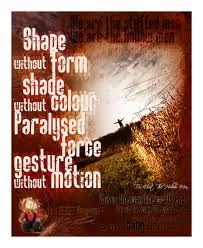2011 Poem: “A Story”
(Li-Young Lee)
Prompt: The following poem is by the contemporary poet Li-Young Lee. Read the poem
carefully. Then write a well-developed essay in which you analyze how the poet conveys the complex relationship of the father and the son through the use of literary devices such as point of view and structure.
Prompt: The following poem is by the contemporary poet Li-Young Lee. Read the poem
carefully. Then write a well-developed essay in which you analyze how the poet conveys the complex relationship of the father and the son through the use of literary devices such as point of view and structure.
A Story
Sad is the man who is asked for a story
and can't come up with one.
His five-year-old son waits in his lap.
Not the same story, Baba. A new one.
The man rubs his chin, scratches his ear.
In a room full of books in a world
of stories, he can recall
not one, and soon, he thinks, the boy
will give up on his father.
Already the man lives far ahead, he sees
the day this boy will go. Don't go!
Hear the alligator story! The angel story once more!
You love the spider story. You laugh at the spider.
Let me tell it!
But the boy is packing his shirts,
he is looking for his keys. Are you a god,
the man screams, that I sit mute before you?
Am I a god that I should never disappoint?
But the boy is here. Please, Baba, a story?
It is an emotional rather than logical equation,
an earthly rather than heavenly one,
which posits that a boy's supplications
and a father's love add up to silence.
and can't come up with one.
His five-year-old son waits in his lap.
Not the same story, Baba. A new one.
The man rubs his chin, scratches his ear.
In a room full of books in a world
of stories, he can recall
not one, and soon, he thinks, the boy
will give up on his father.
Already the man lives far ahead, he sees
the day this boy will go. Don't go!
Hear the alligator story! The angel story once more!
You love the spider story. You laugh at the spider.
Let me tell it!
But the boy is packing his shirts,
he is looking for his keys. Are you a god,
the man screams, that I sit mute before you?
Am I a god that I should never disappoint?
But the boy is here. Please, Baba, a story?
It is an emotional rather than logical equation,
an earthly rather than heavenly one,
which posits that a boy's supplications
and a father's love add up to silence.
Li-Young Lee
2011B Poem: “An Echo
Sonnet” (Robert Pack)
Prompt: Read carefully the following poem by Robert Pack, paying close attention to the
relationship between form and meaning. Then, in a well-written essay, analyze how the literary techniques used in this poem contribute to its meaning.
Prompt: Read carefully the following poem by Robert Pack, paying close attention to the
relationship between form and meaning. Then, in a well-written essay, analyze how the literary techniques used in this poem contribute to its meaning.
AN ECHO SONNET
To an Empty Page
Voice: Echo:
How from emptiness can I make a
start? Start
And starting, must I master joy
or grief? Grief
But is there consolation in the
heart? Art
Oh cold reprieve, where’s
natural relief? Leaf
5 Leaf blooms, burns red before delighted eyes. Dies
Here beauty makes of dying,
ecstasy. See
Yet what’s the end of our
life’s long disease? Ease
If death is not, who is my
enemy? Me
Then are you glad that I must
end in sleep? Leap
10 I’d leap into the dark if dark were true. True
And in that night would you
rejoice or weep? Weep
What contradiction makes you
take this view? You
I feel your calling leads me
where I go. Go
But whether happiness is there,
you know. No
















